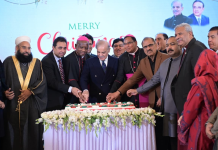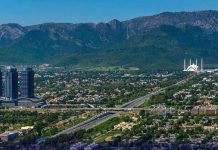Home Pakistan Experts say Pakistan should not choose sides in Middle East
ISLAMABAD, MAR 13 (DNA) -Pakistan needs a more prudent, practical quid pro quo policy for the Middle East, rather than choosing sides.There is need for a more robust and diverse relationship with the region that focuses on developing socio-cultural ties as well as those in the arena of political, security and defence cooperation to carve a niche for itself.
The Islamic Military Coalition to Counter Terrorism (IMCTC) is a coalition of 41 willing countries that forms a pan-Islamic unified front in the global fight against terrorism and violent extremism, and is not against any Muslim country.
Pakistan’s policy on Yemen is governed by the UN Security Council Resolution 2216 under which the country supportsrestoration of legitimate President Hadi’s government and peaceful solution in the light of the Gulf Peace initiative and National dialogue.
Pakistan steadfastly supports the cause of the Palestinians.
There is a need to improve and strengthen research on the Middle East in Pakistan.
These were some of the recommendations and reflections shared by speakers at the One-Day Panel Discussion on‘Dynamics of Contemporary Middle East: Role of Pakistan’ organized by the Islamabad Policy Research Institute here in Islamabad today.
Welcoming the speakers, students, media and diplomats to the Panel Discussion, Ambassador Vice Admiral (R) Khan Hasham Bin Saddique, President of IPRI said that due to US President Trump’s hands-off policy in the Middle East and rise of multipolarity, there is rebalancing of power in the region with states on the one side and non-state actors, on the other. He shared that the Middle East has been a region of turmoil since the 1980s, and to this day, remains aregion in flux. ‘Unfortunately, there is no regional mechanism to address the issue of peace and stability in the Middle East. While the Gulf Cooperation Council (GCC) exists, its role has not emerged as it was envisioned to be,’ Ambassador Saddique pointed out.‘Pakistan has traditionally enjoyed cordial relations with most of the countries in the Middle East, particularly in the political and security cooperation arena. However, we need to have a more robust and diverse relationship with the region that focuses on developing sociocultural ties as well as economic collaboration. Under the current government, Pakistan’s relations with the Middle East are set to scale new heights,’ he remarked.
In the working session moderated by Ambassador (R) ZamirAkram, Former Representative of Pakistan to the United Nations, Prof.DrNazirHussain, Director, School of Politics and International Relations, Quaid-i-Azam University spoke on‘Middle East Geostrategic Conundrum: Implications for Pakistan.’He said that owing to its geostrategic position and rich-energy resources, the Middle East is one of the most important regions of the world. Presently, however, it is facing an inescapable security conundrum due to its internal instability, chaos and disorder. ‘At the regional level, the far-reaching Arab Spring has pushed Syria, Iraq, Libya and Yemen into the ranks of failed states. Rise ofthe Islamic State has emerged as the worst radical threat to the region’s modern history, challenging the regional political order by wiping out the territorial borders and spiraling beyond its borders.’ Prof. Hussain pointed out that despite the fact this fragile and volatile region is of acute importance, there is a dearth of academic research on the Middle East being conducted in Pakistan.
Discussing the issue of ‘Mediating Regional Rivalries: Role of Pakistan’, Ambassador (R) JavedHafeezwas of the view that Pakistan needs to be cognizant that the Middle East region is also of vital importance because it sits on three important commercial sea lanes: Hormuz, Gulf of Aden and the Suez Canal. Hehighlighted that the conflict between the Shia crescent and Sunni axis has been largely exaggerated by the Western media. ‘These are not permanent faultlines, they keep on changing. While Pakistan may be eager to mediate in Middle Eastern affairs, first and foremost, it needs to be invited by the parties involved. The second important aspect of mediation is that the mediator needs to be seen as completely neutral, like Oman. However, because of its size and compulsions, Pakistan cannot become Oman. Thirdly, a mediator needs to be strong, with its own house in order, with peace within and without. ‘Pakistan doesnot qualify on these parameters and should not impose itself in Middle Eastern affairs. Wait for the right time and then step in because this time, the stakes are higher and situation more complex than what it was in the 1990s’, he stressed. ‘Pakistan must take its relations with Middle East seriously. Our future relations with the Arabs need to have more economic and commercial content. And to promote economic interaction, we have to restore the health of our economy, make Pakistan more secure and improve our image. Foreign relations are not guided by ideological factors, or romantic perceptions. It is a game of pragmatism’.
Speaking on ‘Safeguarding Pakistan’s Interest in Middle East’, Prof. DrTughralYamin, Associate Dean, Department of Peace and Conflict Studies, National University of Sciences and Technology, shared vital statistics about Pakistan-Middle East linkages. He pointed out that184, 000 Pakistani pilgrims will perform Hajj this year – 5000 more than last year. However, he also added that overall foreign remittances which stand at USD 19.62 billion from Saudi Arabia are declining, whereas they are increasing from the UAE. Prof. Yamin said that while oil, trade routes, geography and terrain, faith and ideology, all contribute to the strategic importance of the Middle East, ‘Pakistan should not be seen merely as poor nation forever seeking aid and oil on deferred price; as a provider of cheap unskilled labour; and source of a readily available military force that can be used as canon fodder. Pakistan should rebrand itself as a country that is not only militarily powerful, but is a hub of knowledge, an emerging market producing quality agricultural as well as industrial finished goods at competitive rates, and as a peaceful and harmonious tourist destination.’











